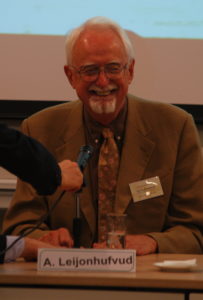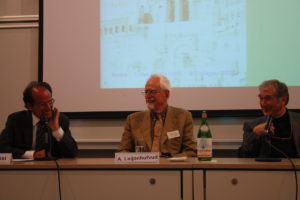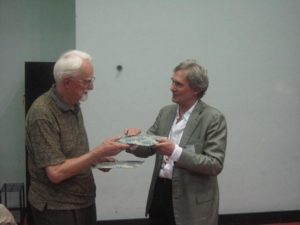Axel Leijonhufvud was the invited speaker of the third STOREP Conference in Lecce, 2006, and the Association celebrated him in a plenary session at the Roma Conference two years later. In 2010, the STOREP Conference was held in Trento, where he had taught and conducted research since 1995. We asked his colleague and friend Elisabetta De Antoni to write a memoir of him for STOREP members.

On 5th May 2022 a dear friend, Axel Leijonhufvud, passed away. Talking about him relieves the pain. Let us start with an unusual and revealing episode in Axel’s biography. After obtaining his Swedish Bachelor degree, he decided to go to sea for some years in order to explore the world. The scion of one of the most emblazoned Swedish families became a stoker in a banana cargo boat. This episode reveals some crucial aspects of Axel’s personality, aspects that also permeate his scientific activity: his intellectual curiosity and his nonconformity.
The common thread of Axel’s works is the issue of coordination. About this, he questioned a key ad hoc assumption of the mainstream theory: the omnipotence of the invisible hand. His Metaphor of the Neoclassical Auctioneer that – from behind the scenes – perfectly coordinates the whole economy made him a true legend. Axel’s deep objection was that coordination cannot be taken for granted but is the result of institutions, rules, economic policies etc. The crucial importance assigned to coordination induced him to analyse the main pathologies of our times, we refer to i) persistent depressions, ii) high inflations, iii) transition problems of centralized economies iv) financial instability. For each of these pathologies, Axel proposed an original and stimulating rereading.

i. Persistent depression
The centrality attributed to coordination led to a reinterpretation and rehabilitation of the Keynesian revolution. In Axel’s view, The General Theory had the merit of removing the Neoclassical Auctioneer. Contrary to the dominant interpretation, Keynes did not introduce price rigidities; he only rejected perfect flexibility. As known, a wrong price in any market can generate involuntary unemployment. In Axel’s view, the most plausible price maladjustment concerns the interest rate (an inter-temporal price) not the money wage. The responsibility for unemployment thus falls on financial speculation, not on trade unions.
ii) High inflation
With Daniel Heymann, Axel analyzed the concrete experience of Argentina’s high inflation. This led them to question the standard neoclassical model of fully anticipated inflation. In an inflationary regime, price dynamics tends to accelerate in an increasing and unpredictable way. In the face of this greater uncertainty, agents simplify their decision process shortening the time horizon of their choices. A short-sighted adaptive behaviour thus replaces the traditional inter-temporal optimizing behaviour. The shortening of the time horizon in turn leads to the progressive drying up of medium- and long- term financial transactions and expenditure decisions. Thus, the real costs of high inflation extend far beyond the inflation tax! High inflation involves heavy recessive effects on investments, activity levels and growth.
iii) Transition economies
This time, Axel questioned the dominant thesis according to which the market promotes a Darwinian efficient selection of firms. The Soviet Union had left a manufacturing system characterized by large plants and by a high vertical integration. In such a context, the closure of public firms at a loss might have triggered a cascade of failures that would have swept away also healthy firms. The inadequacy of the financial and of the fiscal system would have exacerbated the problems. Axel’s advice was to implement the appropriate institutional and regulatory presuppositions; only subsequently and gradually could market mechanisms be activated.

iv) Financial instability
In Axel’s re-reading, the inadequate dominant theory contributed to the crisis through deregulation and through an inflation targeting strategy that stubbornly contained interest rates despite the unprecedented growth in asset prices, in indebtedness and in the riskiness of the new financial instruments. The dominant theory was also not equipped to understand and to tackle the real consequences of the crisis. We were faced by a “balance sheet recession” characterized by a generalized de-leveraging process. In order to avoid insolvency, everybody tried to reduce indebtedness: financial institutions cut credit, firms cut activity levels, households cut consumption. The result was a great world recession. However, the recent financial crisis is just the tip of the iceberg: in the last decades, there have been more and more frequent episodes of financial instability. None of the old and new theories is able to explain this increasing financial instability and to provide adequate diagnoses and therapies. We have to admit our ignorance and look for new ways.

Our broad fresco of Axel’s scientific contribution has tried to show the coherence of his intellectual journey, its originality and perspicacity. It is time to conclude with some considerations concerning Axel’s human aspects. From this point of view, the cargo episode reveals his openness, interest and care towards others. Wherever his public interventions led him, Axel proved to be able to create a climate of sympathy and affection in addition to respect and esteem. We all will miss him a lot.
